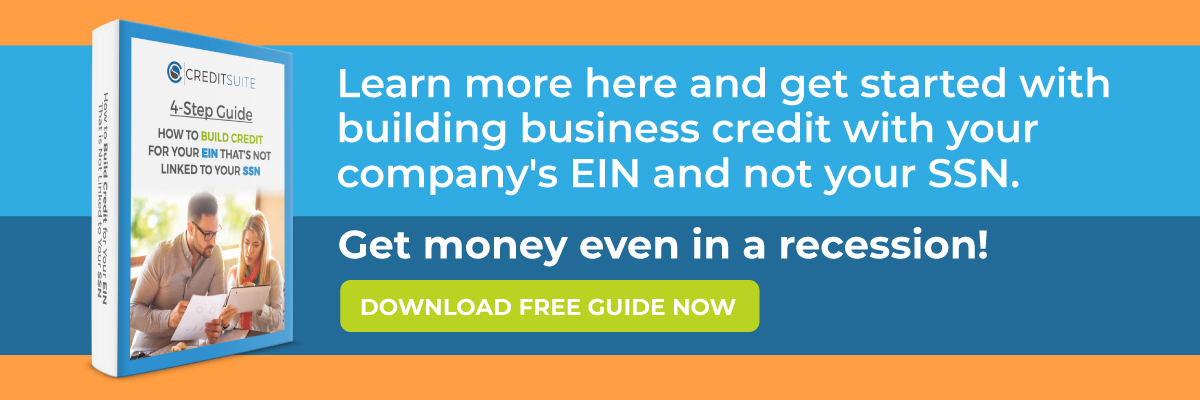Get through recession 2020 even though loan risk factors abound. But you can fix a lot of them with assuring fundability. The easiest way to do this is via building business credit.
Get By Recession 2020 and Answer Lender Questions and Address Small Business Loan Risk Factors With Fundability
Fundability – or, not just the ability to become funded but how desirable a company is for funding – means different things to banks, venture capitalists, angel investors, and informal investors. That being said, they all agree on a few fundamental principles.
1. Do You Have Positive Cash Flow?
Lenders aren’t in the business of giving you gifts. Instead, they would like to see a profit on their investment. For that reason, if you are bleeding funds, they are not going to want to pay for a piece of what, to their minds, is an unsatisfactory financial commitment.
How do you turn it around? Do some economic triage. Perhaps your firm will not need to have an alternative site. Perhaps you don’t need to have a full-time assistant when part-time will do. Maybe you should be leaning harder on your customers with pending invoices. This is one of the biggest small business loan risk factors.
Start-ups will get a different question – see # 2.
2. Do You Have a Great Product or Service?
For startup companies, the concern is more like: do you have a fantastic product or service? A concept in itself is not going to be sufficient, so you also will want to have a comprehensive business system in place. Investors are going to want to see what you can do with your amazing idea, and how it can be successfully monetized.
For a brand-new company this is the biggest of all loan risk factors. Otherwise, why bother making a company at all? Particularly during Recession 2020.
3. What Will You Use the Cash For?
If your reply is an unclear, “general fund”, investors are not going to be showing an interest. First of all, they want you to demonstrate you will be responsible with their money. In addition, they also want to know that your business is organized. You can be the most innovative and the very least business-oriented man or woman out there, so long as anyone in your organization is dealing with the financial heavy lifting. Somebody must make sure that the taxes are paid and the invoices go out to your clients.
Investors don’t actually want to see you using the funds for daily operations. If your business is functioning profitably (see # 1), then investors will expect that you can manage those expenses. Rather, they want to see if you are going to employ their funding for something new and different. In general, this implies you must be using their funds for improvement – a new piece of essential machinery; a new shop; a second facility; a new product line – these are just a few plans which would fit the bill for progress.
See # 4 for the similar question for startups. This is another one of the bigger loan risk factors. Lenders want to know their money isn’t being thrown away. After all, they make a lot more money if you pay your loan off and pay interest. Getting their money back through collections is a lot less profitable for them. And they are going to be looking to maximize their returns during Recession 2020.
4. How Much Funding Do You Need to Reach Positive Cash Flow?
For startups, a similar question is: just how much funding will you need to get to positive cash flow and profitability? In this case, your use for the money is still a distinct one – it’s to bring your new business to profitability.
5. How Much Revenue Yearly Can Your Business Generate After Three Years?
This question is the same whether you are presently in business or you are aiming to get a startup business funded. This will separate the lifestyle businesses (designed to make their owners glad but not develop into bigger players) from the scalable businesses. A lifestyle business normally won’t get this sort of funding. Instead, it will be funded by virtue of secured debt or bootstrapping or secured debt.
A scalable business can still be modest and not expect explosive growth, but still be fundable. Your new widget warehouse might begin small. Investors would expect it to have more moderate funding needs.
6. What Number of Your Existing Clients, Channels, and Partners Will Support Your New Business Growth and Volume?
Introducing new markets (or going for new customers or trying to market new products) will be viewed as riskier, unless you have an established history of financial success via pioneering. See # 7 for the semi-comparable question for startup ventures.
7. How Do You Know That Anybody Will Buy Your Product or Service?
If you do not know your market, then you will not know how to target to those customers. If your clients are middle-aged women, they will most likely respond to different techniques than if your customers are teen boys. Merely making a product and flinging it out to the ether, praying someone will buy it, is not going to sit well with investors. Instead, they want you to have scouted out your prospective clientele prior to you coming knocking and asking for funding.
The rest of the questions are only for startups.
8. How Much Funding Can You Get From Friends and Family to Launch Your Business?
Oftentimes these are your most important investors, or they might be your only investors. Treat them well. This goes double in Recession 2020.
9. How Much Funding Can You Personally Add?
Investors would like to know this amount because it indicates a commitment to the startup. If you want to keep your life savings, you’ll be a lot more careful with funds than if you’re just playing around with other people’s money. Of course you should be even more careful during Recession 2020.
10. Who Comprises Your Team?
Your team does not have to be employees of your business. It can also be consultants and mentors. Contact your school. There might be an educator interested in your new business, even if you never took a class with that person. Not a college alum? Try your nearby community college just the same. A professor might even want to use your company experience and story in a lecture.
Learn more here and get started with building business credit with your company’s EIN and not your SSN.Get money even in Recession 2020!
But How Do You Best Address These Risk Factors During Recession 2020? Build Business Credit!
Small business credit is credit in a business’s name. It doesn’t connect to an entrepreneur’s consumer credit, not even if the owner is a sole proprietor and the only employee of the business.
Because of this, a business owner’s business and personal credit scores can be very different.
Consumer credit scores depend upon payments but also other elements like credit usage percentages.
But for small business credit, the scores truly only hinge on whether a business pays its debts promptly.
The Process
Building company credit is a process. It does not occur automatically. A company has to proactively work to develop small business credit.
Having said that, it can be done readily and quickly, and it is much quicker than building personal credit scores.
Vendors are a big component of this process.
Doing the steps out of order leads to repetitive denials. Nobody can start at the top with small business credit. For instance, you can’t start with retail or cash credit from your bank. If you do, you’ll get a denial 100% of the time.
Company Fundability
A business needs to be fundable to credit issuers and vendors. This is the best way to address any small business loan risk factors.
Hence, a business needs a professional-looking website and e-mail address. And it needs to have site hosting bought from a vendor like GoDaddy.
Additionally, company telephone and fax numbers need to have a listing on 411. You can do that here: http://www.listyourself.net.
In addition, the business phone number should be toll-free (800 exchange or similar).
A business also needs a bank account dedicated solely to it, and it has to have all of the licenses essential for running.
Licenses
These licenses all must be in the perfect, accurate name of the company. And they need to have the same small business address and phone numbers.
So note, that this means not just state licenses, but possibly also city licenses.
Learn more here and get started with building business credit with your company’s EIN and not your SSN.Get money even in Recession 2020!
Working with the Internal Revenue Service
Visit the IRS web site and get an EIN for the business. They’re totally free. Choose a business entity like corporation, LLC, etc.
A company can start off as a sole proprietor. But they more than likely want to change to a variety of corporation or an LLC.
This is to decrease risk. And it will make best use of tax benefits.
A business entity matters when it pertains to taxes and liability in case of litigation. A sole proprietorship means the entrepreneur is it when it comes to liability and taxes. Nobody else is responsible.
Incorporating is a great way to address small business loan risk factors.
Kicking Off the Business Credit Reporting Process
Begin at the D&B website and get a free D-U-N-S number. A D-U-N-S number is how D&B gets a business into their system, to generate a PAYDEX score. If there is no D-U-N-S number, then there is no record and no PAYDEX score.
Once in D&B’s system, search Equifax and Experian’s sites for the business. You can do this at www.creditsuite.com/reports. If there is a record with them, check it for accuracy and completeness. If there are no records with them, go to the next step in the process.
In this manner, Experian and Equifax have something to report on.
Starter Vendor Credit
First you ought to build trade lines that report. This is also called starter vendor credit. Then you’ll have an established credit profile, and you’ll get a business credit score.
And with an established business credit profile and score you can begin to get credit at even more establishments.
These kinds of accounts have the tendency to be for the things bought all the time, like marketing materials, shipping boxes, outdoor work wear, ink and toner, and office furniture.
But to start with, what is trade credit? These trade lines are credit issuers who give you starter credit when you have none now. Terms are commonly Net 30, rather than revolving.
Therefore, if you get approval for $1,000 in vendor credit and use all of it, you must pay that money back in a set term, like within 30 days on a Net 30 account.
Details
Net 30 accounts have to be paid in full within 30 days. 60 accounts need to be paid completely within 60 days. Compared to with revolving accounts, you have a set time when you have to pay back what you borrowed or the credit you made use of.
To start your business credit profile the right way, you need to get approval for vendor accounts that report to the business credit reporting agencies. When that’s done, you can then make use of the credit.
Then pay back what you used, and the account is on report to Dun & Bradstreet, Experian, or Equifax.
You want at least 3, preferably 5 to 8 of these to move onto the next step, retail credit. Here are some stellar choices from us: https://www.creditsuite.com/blog/5-vendor-accounts-that-build-your-business-credit/
Note: it can often be possible to apply for starter vendor credit without your Social Security number. Try it by leaving that section blank, or applying over the phone.
Retail Credit
Once there are at least 3 vendor trade accounts reporting to at least one of the CRAs, then move onto retail credit. These are stores, and they can be either net accounts or revolving.
Just use your SSN and date of birth on these applications for verification purposes. For credit checks and guarantees, use the small business’s EIN on these credit applications – if you can.
Fleet Credit
Are there something like 8 to 10 accounts reporting? Then move onto fleet credit. These are businesses such as BP and Conoco. Use this credit to buy fuel, and to repair, and take care of vehicles. Only use your SSN and date of birth on these applications for verification purposes. For credit checks and guarantees, make sure to apply using the business’s EIN. But that is only if that’s possible. It isn’t always possible. So, this is because federal law requires SSNs on anything to do with banks. If a card ultimately comes from a bank, then a Social Security number is necessary, no matter what.
Learn more here and get started with building business credit with your company’s EIN and not your SSN.Get money even in Recession 2020!
More Universal Credit
Have you been sensibly managing the credit you’ve up to this point? Then move onto service providers like Visa and MasterCard. Only use your Social Security Number and date of birth on these applications for verification purposes. This is a federal law requirement. For credit checks and guarantees, see if you can use your EIN instead.
These are commonly MasterCard credit cards. If you have 14 trade accounts reporting, then these are more likely to be attainable.
Monitor Your Business Credit
Know what is happening with your credit. Make certain it is being reported and address any mistakes as soon as possible. Get in the practice of checking credit reports and digging into the particulars, and not just the scores.
We can help you monitor business credit at Experian and D&B for only $24/month. See: www.creditsuite.com/monitoring.
At Equifax, you can monitor your account at: www.equifax.com/business/business-credit-monitor-small-business. That will cost about $19.99.
Update Your Information
Update the details if there are inaccuracies or the details is incomplete.
Fix Your Business Credit
So, what’s all this monitoring for? It’s to contest any inaccuracies in your records. Mistakes in your credit report(s) can be fixed. But the CRAs often want you to dispute in a particular way.
Disputes
Disputing credit report inaccuracies typically means you send a paper letter with copies of any proof of payment with it. These are documents like receipts and cancelled checks. Never mail the originals. Always mail copies and retain the original copies.
Fixing credit report inaccuracies also means you specifically spell out any charges you dispute. Make your dispute letter as understandable as possible. Be specific about the issues with your report. Use certified mail to have proof that you sent in your dispute.
Taking the initiative and handling any errors as fast as possible will also help address any small business loan risk factors.
A Word about Building Business Credit
Always use credit sensibly! Don’t borrow beyond what you can pay back. Track balances and deadlines for payments. Paying off promptly and completely does more to boost business credit scores than just about anything else. And beyond that, responsible account management will counter any small business loan risk factors.
Establishing company credit pays. Great business credit scores help a small business get loans. Your loan provider knows the business can pay its debts. They know the business is for real.
The company’s EIN links to high scores and lending institutions won’t feel the need to call for a personal guarantee.
Getting Through Recession 2020: Takeaways
Business credit is an asset which can help your business in years to come. Learn more here and get started toward establishing company credit. And stop worrying about Recession 2020!




